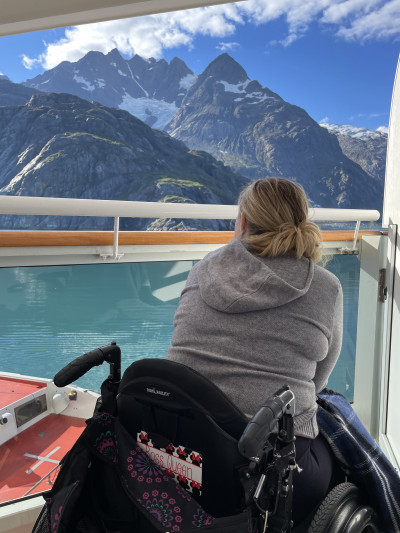Navigating life with reduced mobility comes with its unique set of challenges, but with the right strategies and resources, individuals can thrive and enjoy a fulfilling life. When combined with the freedom and relaxation of a cruise, these strategies can create an incredibly rewarding experience. Heres how the combination of life strategies and the joy of cruising can lead to greater contentment.
Acceptance and Positivity
Acknowledge Your Feelings: It's normal to experience a range of emotions. Allow yourself to feel and process them. It can be hard to accept that you cant continue doing everything you used to, and a holiday on the seas may not have seemed possible. Be open-minded and explore new alternatives.
Focus on Positives: Shift your focus to what you can do rather than what you cant. Celebrate the small victories and progress. Cruising is inherently flexible, with ships designed for accessibility, featuring ramps, elevators, and spacious common areas. A positive mindset means mobility issues wont limit your ability to enjoy the experience.
Physical Adaptations
Mobility Aids: Use tools like wheelchairs, walkers, mobility scooters, or electric wheelchairs to maintain independence.
Cabin Modifications: Make your cabin more accessible with grab bars, toilet frames, and perching stools to enhance comfort.

Emotional Support
Connect with Loved Ones: Maintain strong relationships for emotional support. Reach out to friends or family members who are familiar with cruising to gain insight and reassurance.
Support Groups: Join groups for individuals with similar experiences to share, learn, and encourage each other. Many cruise lines have Facebook groups where guests can connect before the trip, boosting confidence.
Healthy Lifestyle
Exercise: Engage in exercises suited to your abilities to stay active and improve mood. Try water activities on board or gently stroll around the promenade decks, where the changing vistas make each walk unique.
Nutrition: Eat a balanced diet to maintain health and energy. Cruises are renowned for their culinary offerings, so making healthy choices is easier than ever.
Mental Well-being
Mindfulness and Meditation: Practice mindfulness techniques to manage stress and anxiety. Major cruise lines offer relaxing environments such as thermal suites and serene atmospheres where you can unwind. Enjoy therapeutic or beauty treatments to enhance mood and self-confidence.
Professional Help: Seek advice from qualified therapists and fitness experts in the ships wellbeing and fitness centres, which offer bespoke programs like yoga classes.
Engage in Hobbies
Explore New Interests: Discover activities like painting, reading, photography, karaoke, or bridge. Every cruise ship offers a variety of classes and pastimes, so you might find something new and exciting.
Adapt Old Hobbies: Modify past hobbies to suit your current abilitiesthink ballroom dancing, sushi-making, or cocktail crafting.
Education and Advocacy
Stay Informed: Learn about your condition and how to manage it effectively. The more informed you are, the more successful your cruise experience will be.
Advocate for Yourself: Speak up about your needs and rights. Don't assume that others will automatically understand your conditionbe clear about what you need.
Technological Assistance
Assistive Technology: Use technology designed to assist with reduced mobility, such as voice-activated devices or adaptive software. Many cruise ships offer visual or tactile alert systems upon request, including for door locks, telephone rings, or alarm clocks, enhancing accessibility.
Routine and Organisation
Establish a Routine: Create a daily schedule to maintain normalcy and purpose. Regular meals and flexibility are essential for many conditions, and cruising offers a variety of dining options that can meet those needs.
Organise Your Space: Keep your living space well-organised to minimise physical strain. Consider tools like transfer aids or grabbers to make daily tasks easier.
Seek Professional Advice
Medical Professionals: Regularly consult healthcare providers to monitor and manage your condition. When booking your cruise, make sure to disclose your medical information so you can receive the best advice on suitable cabins.
Occupational Therapists: Work with therapists to develop strategies for daily activities. Life on board might require adjustments, especially if your condition affects balance. Collaborating with experts like Mobility at Sea ensures that the right equipment is available and appropriately used.
Remember, everyones journey is unique, so its essential to find what works best for you. By adopting these strategies, you can lead a fulfilling and empowered life despite the challenges of reduced mobility. Partnering with Mobility at Sea ensures that your needs are considered throughout the booking process, creating a seamless and enjoyable cruise experience.
Having reduced mobility doesnt mean you have to give up on your dreamsyou just need to find what works for you and do it more often!
So many of our dreams at first seem impossible, then they seem improbable, and then, when we summon the will, they soon become inevitable. - Christopher Reeve
Date published: 19/03/2025